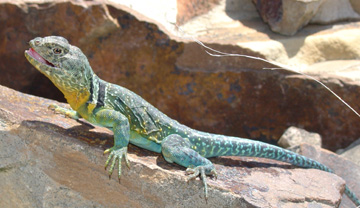 Stanley Fox, Jennifer Grindstaff, Matthew Lovern, and Ronald Van Den Bussche, in the OSU Department of Zoology, received a $500,000 grant from The National Science Foundation to study development of sexual selection. In many animal species, males and females are different in appearance and behavior and these differences usually arise about the time of puberty, when hormone changes occur. However, it’s possible these sexual differences could develop earlier in life as long as the advantages of the differences are expressed later, as adults, in gaining mates. This early, pre-reproductive expression of sexual differences (and the later advantages) has not been the subject of much study. In one excellent case, hatchling male collared lizards that are setting up their territories develop a bright orange color signal and treat other hatchling males aggressively and hatchling females non-aggressively. These young males begin to pair bond with young females as future mates and repel young males as future mate rivals. This study uses biochemical, genetic, molecular, and field experimental approaches to document the hormones responsible for the development of the early sexual differences in this species, and the genetic advantages expressed later in life. Possible costs due to increased conspicuousness and potential negative effects on immune function are also measured. This species is a model for the study of this phenomenon, and results could apply broadly, even to humans. The research should spur more investigation of early sexual differentiation and plant a paradigm shift in evolutionary ecology, as precocial sexual selection. Also see a recent press release for the project here and here.
Stanley Fox, Jennifer Grindstaff, Matthew Lovern, and Ronald Van Den Bussche, in the OSU Department of Zoology, received a $500,000 grant from The National Science Foundation to study development of sexual selection. In many animal species, males and females are different in appearance and behavior and these differences usually arise about the time of puberty, when hormone changes occur. However, it’s possible these sexual differences could develop earlier in life as long as the advantages of the differences are expressed later, as adults, in gaining mates. This early, pre-reproductive expression of sexual differences (and the later advantages) has not been the subject of much study. In one excellent case, hatchling male collared lizards that are setting up their territories develop a bright orange color signal and treat other hatchling males aggressively and hatchling females non-aggressively. These young males begin to pair bond with young females as future mates and repel young males as future mate rivals. This study uses biochemical, genetic, molecular, and field experimental approaches to document the hormones responsible for the development of the early sexual differences in this species, and the genetic advantages expressed later in life. Possible costs due to increased conspicuousness and potential negative effects on immune function are also measured. This species is a model for the study of this phenomenon, and results could apply broadly, even to humans. The research should spur more investigation of early sexual differentiation and plant a paradigm shift in evolutionary ecology, as precocial sexual selection. Also see a recent press release for the project here and here.
